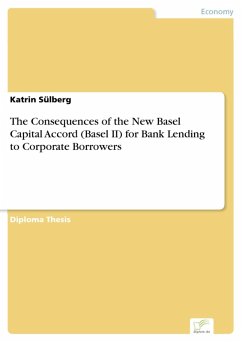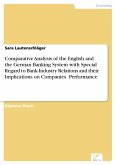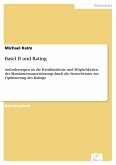Inhaltsangabe:Abstract: The central problem and resulting question of this thesis was: 'Will Basel II make credits in the ¿Mittelstand¿ more expensive?' In view of the previous analysis on possible capital requirements and changes in credit conditions for German small and medium-sized enterprises, the answer to this question can be adequately answered: On average, Basel II does not make credits in the ¿Mittelstand¿ more expensive. Basel II has an influence on the amount of regulatory capital the banks have to hold. The costs of this scarce factor are included in the risk premium which is part of the borrower¿s credit rent. Therefore, the credit rent would ceteris paribus be higher if capital requirements rose. However, it has been shown that for about 90% of German companies, capital requirements will even be lower in Basel II. This is because these companies will belong to the retail segment in Basel II where there is a reduction in regulatory capital (compared to the current 8%) up to a high probability of default between 7% and 8%, which would apply to a company in default or bankruptcy. Additionally, capital requirements for small and medium-sized enterprises can be further reduced due to the extended recognition of collaterals. Basel II has introduced types of collaterals that small and medium-sized companies are more often able to deliver, namely account receivables and real estate. It can therefore be concluded that a possible future increase in average credit rent levels for German small and medium-sized enterprises must have other reasons than the banks¿ costs for regulatory capital. Zusammenfassung: ¿Jede Wirtschaft beruht auf einem Kreditsystem, das heißt, auf der irrtümlichen Annahme, der andere werde gepumptes Geld zurückzahlen¿ (Kurt Tucholsky, 1931) Kreditinstitute spielen eine besondere Rolle in modernen Volkswirtschaften. Sie sind nicht nur Mittler zwischen Kreditnehmern und Einlegern, sondern stellen darüber hinaus vielfältige nicht bilanzwirksame Finanzdienstleistungen zur Verfügung. Dabei ist der professionelle Umgang mit Kredit-, Markt-, Liquiditäts- und anderen Risiken eine der wichtigsten Leistungen von Finanzintermediären. Solche Risiken dürfen jedoch nicht zu Instabilitäten im Finanzsektor führen. Über die eigene Risikovorsorge der Institute hinaus wurden deshalb besondere Aufsichtsregeln für Kreditinstitute geschaffen, unter denen die Eigenkapitalregeln eine herausragende Rolle einnehmen. Im dynamischen und [...]
Dieser Download kann aus rechtlichen Gründen nur mit Rechnungsadresse in A, B, BG, CY, CZ, D, DK, EW, E, FIN, F, GR, HR, H, IRL, I, LT, L, LR, M, NL, PL, P, R, S, SLO, SK ausgeliefert werden.









